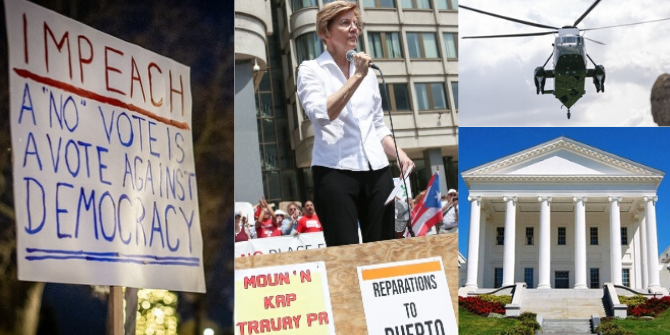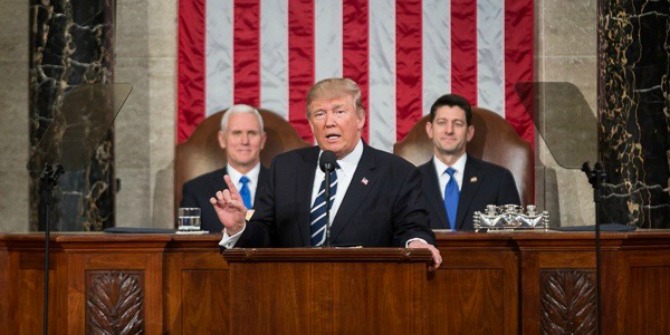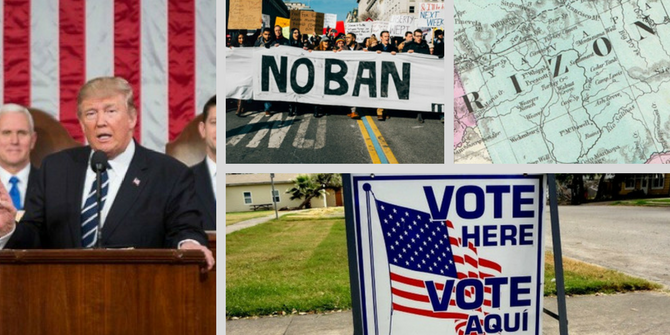 The past year has seen developments in politics and policy that few could have predicted, even in the wake of Donald Trump’s unexpected 2016 election victory. USAPP Managing Editor, Chris Gilson, reviews 2017’s twists and turns and what we said about them. Let us know your own political highlights of 2017 in the comments below!
The past year has seen developments in politics and policy that few could have predicted, even in the wake of Donald Trump’s unexpected 2016 election victory. USAPP Managing Editor, Chris Gilson, reviews 2017’s twists and turns and what we said about them. Let us know your own political highlights of 2017 in the comments below!
January – The Trump Dossier and an “America First” Inauguration
To many it may seem like much more than a year has passed, but as 2017 began Barack Obama was still President of the United States. Obama, unlike Donald Trump, often used positive and inclusive language to achieve his election victories in 2008 and 2012.
Even before his inauguration on January 20th, Trump was already causing headlines; the ‘Trump Dossier’ claimed that the then-nominee had close ties to Russia, but was it aimed at undermining American democracy rather than Trump himself? By early January Trump had also picked some of his foreign policy team – US Centre Director, Professor Peter Trubowitz commented at the time that by choosing “America Firsters”, Trump was showing that he was seeking a foreign policy which would fully exploit the US’ strategic advantages.
Donald Trump’s inaugural address was certainly controversial, promising to “restore greatness” to America, and blaming globalization for the woes of the middle classes. Our experts called it “Remarkably pessimistic, remarkably despondent”, said that it “signaled a sharp turn toward nationalism and perhaps isolationism”, and that his vision of “America First” made clear that he would “not play the political game as usual”.
February – A border wall and a Muslim ban
Two of Trump’s early actions as President were to sign the order to construct his much-touted border wall with Mexico and another banning immigration into the US from seven Muslim countries. Eric Kaufmann of Birkbeck College in London argued that “Trump’s Wall is not racist, [but] the Muslim ban is”, and wrote that:
Trump seamlessly intertwines racist policies such as banning Muslims from certain countries with legitimate conservative positions such as the Wall. His #NoWallNoBan adversaries label everything racist, bundling Trump’s disgusting and merely conservative policies together.
By contrast, then LSE PhD student, Susannah Crockford wrote that the US-Mexico wall was a “symbolic monument” to white conservatives that President Trump would keep them safe, rather than a sensible immigration policy. Meanwhile, academic experts found that the protests which followed Trump’s immigration order targeted towards Muslim countries may have helped shift public opinion against it, with 25 percent more Democrats and 15 percent more Republicans becoming opposed to it after the ban was put in place.
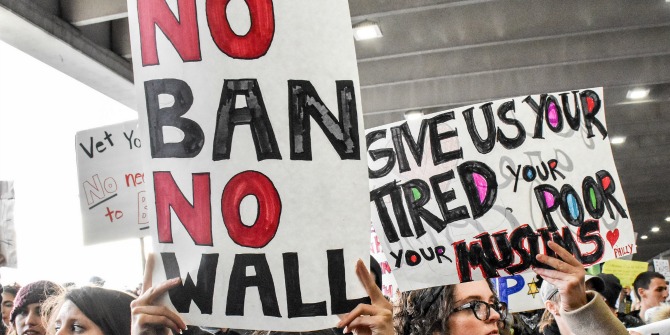
Image credit: Joe Piette (Flickr, CC-BY-NC-2.0)
Ron Pruessen summed up what many were also thinking, commenting in February that “Donald Trump’s first weeks as president evoke Boschian visions of destruction and spectacle.”:
Bosch put a smoking, charred, and crumbling city in the background of his tortured landscape. Will that too have its counterpart in 2017, as the foundations of the proverbial American “city on a hill” are shaken by Trumpian trumpet blasts
March – Obamacare on the chopping block and Gorsuch before the Senate
During the Obama years, Congressional Republicans enacted dozens and dozens of bills which would repeal the Affordable Care Act, none of which made their way into law. With the GOP now in unified control of the Executive and Legislative branches, an attempt at repeal should theoretically have met with more success. This was not to be the case. Early versions of the legislation to repeal and replace Obamacare were met with protests; Phillip Rocco of Marquette University wrote that the bill, which may have led to 24 million Americans losing their health insurance coverage would end up hurting the Republican Party’s base the most. Others warned that a bill drawn up with so much haste might be full of mistakes, and that it might end up costing Republican incumbents at the ballot box by as much as 11 percentage points in 2018.
March also saw the US Senate consider the nomination of Judge Neil Gorsuch to the Supreme Court. At time, John D. Rackey and P.C. Peay argued that despite their opposition, Senate Democrats should vote to end debate on the nomination, thus pushing it through, while Alex Garlick commented that Senate Republicans should have a view to the future, and should not change the rules to confirm Gorsuch with 51 votes rather than 60 (they didn’t listen though).
Melissa Deckman of Washington College wrote on the possibility that the “Resist Trump” movement could transform into the Tea Party of the left.
And who can forget the launch of Season 2 of our monthly podcast, The Ballpark?
April – Georgia’s 6th and Trump’s Syria strike
We only had to wait until April for our first election of the Trump era, with a runoff for Georgia’s 6th Congressional district. Jamie Monogan warned against considering the contest in a safe GOP district to be a referendum on Donald Trump, citing its “jungle primary” and the importance of the candidates rather than the national parties.
On April 10th there was a tragic shooting at a school in San Bernardino, California. Sierra Smucker of Duke University wrote that the US political system was largely to blame for allowing domestic abusers access to guns:
Not all states ban domestic abusers from obtaining firearms and porous borders undermine states’ ability to enforce a firearm ban. For instance, a man convicted of domestic abuse cannot purchase a firearm in California but he can buy one in Arizona. He would only need to drive across the border, obtain a gun, come back, and commit the murder he planned.
On April 7th, President Trump ordered a cruise missile strike against a Syrian airbase in response to the use of chemical weapons by the regime of President Bashar al-Assad. Jasmine Gani commented that the action might be a positive step if it proved to be a check on further Syrian aggression.
May – Investigation into Trump Russia ties intensifies
The investigation into allegations of collusion by the Trump campaign with Russia during the 2016 presidential election intensified with the appointment of Special Prosecutor Robert Mueller on May 17th by Deputy Attorney General Rod Rosenstein. Interestingly, a May analysis of public statements from both the US and Russia shows that President Trump has been more positive towards Russia than President Obama, and that Russian President Vladimir Putin has responded in kind.
June – Withdrawing from Paris and the troubles with Trump’s tweetstorms
The Trump administration announced that it would be leaving the Paris Agreement on climate change. Bob Ward of the LSE’s Grantham Research Institute on Climate Change and the Environment argued that, given that the targets set by the Obama administration were not legally binding, Trump’s reasoning behind withdrawing from the agreement were based on flawed assumptions. Might the states be able to pick up the slack on addressing climate change instead? Katja Biedenkopf of the University of Leuven, Belgium suggested that they might:
My analysis of US state-based GHG emissions trading suggests that strong and proactive gubernatorial entrepreneurs can seize opportunities for ambitious climate policy provided by a federal-state context in which the federal government is inactive.
June 14th saw another mass shooting – this time Republican lawmakers were targeted. Such events often lead lawmakers to call for greater access to firearms, not less.
In late June, the US Supreme Court ruled in the case Trinity Lutheran v Comer that government can fund religious institutions directly. Ursula Hackett wrote that the case was significant because:
…it reinforces an accelerating trend toward accommodationism in church-state cases. We can expect greater judicial support for state funding of many types of religious institutions and services, from schools to hospitals and welfare services, which may include those that discriminate against, for instance, disabled students or LGBT individuals.
President Trump quickly became known for his ‘tweetstorms’ – but it turns out that they may be driving down his approval ratings.
July – Trump’s Boy Scouts speech and transgender ban tweets
On the 24th of July, President Trump addressed the National Boy Scout Jamboree in West Virginia. His speech addressed many of the same themes that were integral to Trump’s election campaign: draining the “swamp” of Washington DC and attacks on the media. So why does Trump say the same things to different audiences?
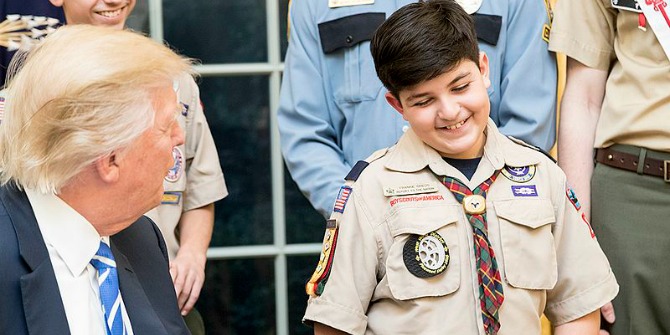
“President Trump’s First 100 Days: 31” by The White House is licenced under Public Domain Mark 1.0
Trump continued his policy-making via Twitter in July by announcing via the social media network that transgendered individuals would no longer be able to serve in the US military. Thomas Crosbie argued that Trump’s order ignores the military’s tradition of progressive politics, and that they should not stay silent at times such as this.
August – Hurricanes hit and racist violence in Charlottesville
This year’s hurricane season was a brutal one for the US: Houston and Puerto Rico were especially hard hit. Rebecca Elliot of LSE Sociology wrote that many Americans don’t have flood insurance because they simply can’t afford it, rather than not having access to information; Kate Derickson argued that Houston’s post-hurricane rebuilding must also involve poorer neighborhoods and communities of color; and Alejandro Quiroz Flores found that US disaster protection was not up to scratch in the states which are most vulnerable to hurricanes. The aftermath of Hurricane Maria in Puerto Rico also exposed just how little Americans know about the US territory according to Lorrin Thomas of Rutgers University-Camden.
On August 12th, Heather Heyer was murdered while protesting a Unite the Right rally in Charlottesville. In the aftermath of Heyer’s death, President Trump suggested that “both sides” were responsible for the violence. Discussing Trump’s statements, Diana Popescu of the LSE’s Government Department argued that:
For white supremacists holding strong beliefs that Antifa and BLM are violent, the statement equally seamlessly fits in with their narrative of Trump ‘telling it as it is’.
September – Trump’s Drug War rhetoric and North Korea and nuclear weapons
The first chapter of Alabama’s Senate special election unfolded at the end of September, with a GOP runoff between former state Attorney General Luther Strange and former state Supreme Court Justice, Roy Moore. Andrée E. Reeves of the University of Alabama in Huntsville argued that the election mirrored the national struggle for the heart and soul of the Republican Party.
The Trump administration has also changed tack in its drug policies, moving back to embracing past rhetoric of the “war on drugs”. John Collins of the US Centre’s International Drug Policy Unit wrote that:
With the inauguration of President Trump US federal drug policy has undergone a fairly radical reversal. The Department of Justice has reprioritised drug offenses, the administration’s response to the opioid epidemic has been confused, lacklustre and the President has generally resorted to platitudes about discredited supply side fixes and border enforcement.
Image credit: U.S. Coast Guard photo by Petty Officer 2nd Class Connie Terrell.
Much of 2017 was marked by escalating tensions between the US and North Korea over the latter’s nuclear weapons program. Vuk Vuksanovic argued that North Korea would be unlikely to give up its weapons as they act as a deterrent to international intervention, an instrument of foreign policy, and as a way of maintaining support domestically.
Trump came into office claiming that he would “drain the swamp” of cronyism and special interests in Washington DC. The resignation of Tom Price, Trump’s Secretary of Health and Human Services after controversy over his use of private and government flights at taxpayers’ expense shows the emptiness of Trump’s promise.
October – Las Vegas mass shooting and gerrymandering before the Supreme Court
On October 1st, a gunman opened fire on a crowd of concert attendees in Las Vegas, killing 58 and injuring more than 500. What followed was debate over whether the largest mass shooting in US history should be considered terrorism; research from Connor Huff and Joshua D. Kertzer of Harvard University found that people are more likely to describe a violent event as terrorism if the perpetrator is Muslim and has policy goals.
A major case covering the constitutionality of how Wisconsin’s congressional districts were drawn – Whitford v Gil – was before the US Supreme Court in October. This case should be seen against the Supreme Court’s historic enabling of large-scale gerrymandering after 2004. Some have suggested using simple mathematical formulae to redistrict Congressional seats – others are not so sure, suggesting that there are limitations to such an approach and that they should be used alongside systems which use public participation in the redistricting process.
The US National Park service considered raising entry fees at its most popular parks in October. New research shows us that even asking for a small fee means that many – especially those on low incomes – won’t go and will instead seek out cheaper alternatives.
November – Trump’s UK Twitter spat, the Opioid crisis, and elections, elections, elections!
While a presidential and Congressional off-year, 2017 still had its share of November elections. Tory Mallett of LSE Sociology wrote on Seattle City Council’s experiment in public funding for candidates which may be both good and bad for democracy. Virginia and New Jersey had gubernatorial and legislative elections: Trump cast a shadow over Virginia’s close races while New Jerseyans had mostly tuned out from theirs.
Democrats won big in both New Jersey and Virginia. Jaclyn Kettler looked at how the party can build on their 2017 wins going into the 2018 midterm elections:
These November electoral wins may help increase enthusiasm and energy for the Democratic Party in state and local races, something that has been lacking in recent years as Democrats have suffered immense losses at the state level.
October’s episode of The Ballpark on the ongoing US opioid epidemic was especially apt given President Trump’s declaration of the opioid crisis as a “health emergency”. Featuring John Collins and Alex Soderholm of the International Drugs Policy Unit, the podcast dissects the key questions behind the epidemic: what’s at the root of this opioid crisis? Where are these drugs coming from? And what can the US do about it?
For much of 2017, the online retailer, Amazon.com has been looking for a place to locate its second headquarters. But what determines when local governments make use of economic incentives to attract businesses?
At the end of November, President Trump retweeted the rhetoric of the far-right Britain First organisation, which led to a transatlantic Twitter spat between Trump and UK Prime Minister, Theresa May. Ben Margulies of the University of Warwick wrote that Trump’s tweets show how his populism may threaten the US-UK Special Relationship.
December – Democrats triumph in Alabama while Al Franken resigns
In a year of many surprises, one of the most unexpected election outcomes was Democrat Doug Jones’ victory in deep-red Alabama over Judge Roy Moore in Alabama. Jones’ win came in the wake of allegations of sexual misconduct by Moore. The victory may well boost the national fortunes of the Democratic Party in 2018.

“Doug Jones election watch party” by Jamelle Bouie is licensed under CC BY 2.0
This month reminded us that the culture wars are still not over – Chris Barker of Southwestern College looked at a case before the Supreme Court revolving around the right of a cake-maker to refuse to make and sell a cake celebrating a couple’s same-sex marriage.
One of 2017’s most significant developments was the bringing to light of sexual misconduct, assault and abuse by men in positions of power. Minnesota Senator Al Franken has been accused of past sexual misconduct and announced his resignation. His move may lead to legislative gridlock in his home state.
- Featured image: By Office of the Speaker [Public domain], via Wikimedia Commons
Please read our comments policy before commenting.
Note: This article gives the views of the author, and not the position of USAPP– American Politics and Policy, nor of the London School of Economics.
Shortened URL for this post: http://bit.ly/2ClPcaN
_________________________________
About the author
 Chris Gilson – LSE US Centre
Chris Gilson – LSE US Centre
Chris Gilson is Managing Editor of USAPP – American Politics and Policy, the blog of the LSE’s United States Centre. He also launched and managed the LSE’s British Politics and Policy blog (2010), and EUROPP – European Politics and Policy (2012), and supports the creation and management of other blogs around the LSE. He has a undergraduate and a Masters degree in Geography, and a postgraduate diploma in Strategic Management, all from the University of Waikato, Hamilton, New Zealand. With his coauthors, Chris has won a Times Higher Education Award for Knowledge Exchange. His interests include blogging, research communication, US politics, urban politics, and community activism. He tweets @chrishjgilson.



